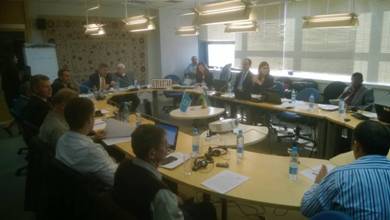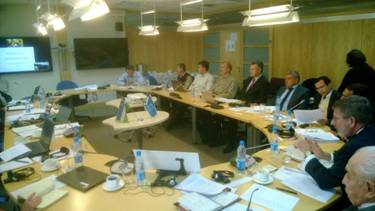GWP CACENA/WORLD BANK PLANNING MEETING ON MODEL CAPACITY TRAINING PROGRAM
The Planning meeting on Model Capacity Training Program organized by GWP CACENA jointly with World Bank was held in Tashkent, Uzbekistan on October 15-17, 2014.
GWP CACENA in partnership with the World Bank is commencing the Aral Sea basin-wide “Strengthening Model Capacity Training Program” and invited experts to contribute an interactive discussion to help define a curriculum for strengthening model capacity program. The first - planning meeting was co-hosted with GWP CACENA at the World Bank office in Tashkent, Uzbekistan with videoconference connections at the World Bank offices of the riparian countries (Afghanistan, Kazakhstan, Kyrgyz Republic, Tajikistan and Turkmenistan).
 Participants included AralDIF, ASBmm and BEAM model consultants; GWP CACENA as a training facilitator; Professor Daene McKinney from Texas University, USA for pedagogical guidance, World Bank representatives; regional and national specialists and observers. The regional and national specialists were invited from government institutes, universities, or the national Academy of Sciences. The invited experts have strong analytical and technical capacities, were widely respected by Central Asia water community, and able to represent regional and national interests in planning and preparing a curriculum and for the model capacity training program.
Participants included AralDIF, ASBmm and BEAM model consultants; GWP CACENA as a training facilitator; Professor Daene McKinney from Texas University, USA for pedagogical guidance, World Bank representatives; regional and national specialists and observers. The regional and national specialists were invited from government institutes, universities, or the national Academy of Sciences. The invited experts have strong analytical and technical capacities, were widely respected by Central Asia water community, and able to represent regional and national interests in planning and preparing a curriculum and for the model capacity training program.
 In preparing for the planning meeting, information was distributed to inform on what has been completed to date, why the three models were selected as exemplars, and provide background for meeting discussions. Documents included:
In preparing for the planning meeting, information was distributed to inform on what has been completed to date, why the three models were selected as exemplars, and provide background for meeting discussions. Documents included:
(a) Background History: Road Map executive summary and section of the model discussion provides background on what has been done to date, and how the model training evolved; the WB Model inventory, illustrates the many national models completed and/or are operating in the basin; Comparative analysis of eight key models, selected from the model inventory with a few additional models, were reviewed against as set of parameters to determine how these models function;
(b) Model documents: AralDIF, ASBmm, and BEAM model briefs and others were prepared for a basis of discussion - how proposed training program would be based on their application;
(c) Training material: the draft curriculum, prepared as a basis of discussion to formulate the training program for a range of audience and addressing national and regional interests; schematic of training activities illustrates the training process.
During the meeting the core model expert group (MEG) was created. The MEG members did a review model documents sent in advance of meeting, including the draft training curriculum. The main output of the meeting is final training curriculum and draft plan of pilot training, which should be agreed with ICWC members to push forward its practical implementation starting from January 2015.
Source: GWP CACENA
ASIAN WATER HIGH LEVEL ROUNDTABLE
The Water Corporation of South Korea (K-Water) has initiated a contribution to the scientific and technological process of the 7th World Water Forum (WWF) in the form of a special report (White Paper). To do this, K-Water has invited senior representatives from regional and national water management organizations from the Asian region to take part in this initiative in the format of the Asian water high level roundtable (AWHoT).
The main AWHoT objective is to highlight the common water management issues in the Asian region and ways to solve them through the creation of a sustainable network of multilateral cooperation and finding a regional consensus, as well as AWHoT suggests contribute to the success of the 7 th World Water Forum.
AWHoT was set up during the Singapore International Water Week in June 2014, consisting of 15 members, including ADB, UNESCO, the World Bank, APWF, Mekong Commission, GWP and national representatives from Singapore, Hong Kong, Taiwan, Myanmar, Vietnam and South Korea. At the first meeting of the AWHoT there were discussed aspects of a common understanding of the regional water management issues in Asia.
The second meeting of AWHoT is dedicated to the International Water Week Nakdong River Basin in South Korea. The meeting was held on October 20-21 in Gyeongju - the capital of the future 7th WWF.
The meeting consisted of three sessions. During the first session of the meeting participants heard eight presentations on problems and prospects of water management in the region: Vietnam, Indonesia, Nepal, Mongolia, Singapore, Taiwan, Thailand and Uzbekistan. Presentation on behalf of the Ministry of Agriculture and Water Resources of Uzbekistan presented by the GWP CACENA Regional Coordinator Vadim Sokolov.
During the second session there was proposed a structure for the future report (White paper), which is supposed to present the 7 th World Water Forum, on behalf of AWHoT in April 2015. The common features are the presence in Asia of the political context of water issues, a crisis in all types of water uses, as well as the urgent need to find solutions for the future multi-purpose development of water management. The all members present unanimously agreed on the composition of the AWHoT’s future report, which will consist of two parts: 1 country profiles of problems and prospects in Asia, 2 pan-regional issues in Asia, including five themes:
a) Water infrastructure and financing (ADB team leader);
b) Water and Sanitation (Singapore team leader);
c) Problems of hydropower (Nepal team leader);
d) Cross-border cooperation - the Mekong river basin (Vietnam team leader);
e) Problems of aquatic ecosystems - the Aral Sea basin (Uzbekistan team leader).
During the third session, the Executive Director of the K-Water Institute, Mr. Choi presented the structure and format of national reports that each country should prepare for the next meeting of the AWHoT. At the invitation of Mr. Thapa, President of the Bagmati civilization association, the participants unanimously agreed that the third meeting of the AWHoT will be held in Kathmandu, Nepal in February 2015. This meeting should finalize the Asian country profiles and five thematic reports.
Source: GWP CACENA
|